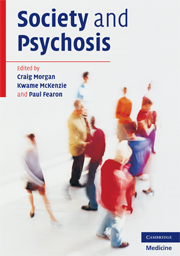Book contents
- Frontmatter
- Contents
- Contributors
- Acknowledgements
- 1 Introduction
- 2 Climate change in psychiatry: periodic fluctuations or terminal trend?
- Part I Theoretical and conceptual foundations
- Part II Social factors and the onset of psychosis
- Part III Social factors and the outcome of psychosis
- Part IV Models and conclusions
- 14 Theories of cognition, emotion and the social world: missing links in psychosis
- 15 Society and psychosis: future directions and implications
- Index
- References
14 - Theories of cognition, emotion and the social world: missing links in psychosis
from Part IV - Models and conclusions
Published online by Cambridge University Press: 07 December 2009
- Frontmatter
- Contents
- Contributors
- Acknowledgements
- 1 Introduction
- 2 Climate change in psychiatry: periodic fluctuations or terminal trend?
- Part I Theoretical and conceptual foundations
- Part II Social factors and the onset of psychosis
- Part III Social factors and the outcome of psychosis
- Part IV Models and conclusions
- 14 Theories of cognition, emotion and the social world: missing links in psychosis
- 15 Society and psychosis: future directions and implications
- Index
- References
Summary
Introduction
Throughout the twentieth century, clinicians and researchers struggled to establish a convincing account of psychosis and the processes and mechanisms underlying its manifestations. This effort depended on refinements of classification and case definition over the whole course of the century. However, despite the huge investment of intellectual energy and monetary resources, results have been slow in coming and disappointingly piecemeal. It has become clear that psychosis is a phenomenon of great complexity. Recent social and cognitive models of psychosis are attempts to deal with some aspects of this complexity. We will argue for the appositeness of such models, and place them within the broader research effort in psychosis. Before doing this, we need to revisit some of the consequences of the formulation of the concept of schizophrenia, the disorder that represents the core of psychotic phenomena.
A failed category?
The idea that schizophrenia is a failed category emerges regularly in the psychiatric and psychological literature, the most prominent current advocate being Bentall (2003). This is essentially a criticism of approaching schizophrenia as a medical entity. The medical strategy of investigation involves the identification of syndromes, which, in turn, form the basis of theories. These include those relating to aetiology, pathology, outcome and treatment (Wing, 1978). Syndromes are essentially theoretical constructs: while they can be regarded as disease entities, they are never really more than tentative. Nevertheless, there is a tendency in psychiatry to regard psychiatric syndromes as having more virtue than they actually possess.
Keywords
- Type
- Chapter
- Information
- Society and Psychosis , pp. 219 - 237Publisher: Cambridge University PressPrint publication year: 2008
References
- 7
- Cited by

